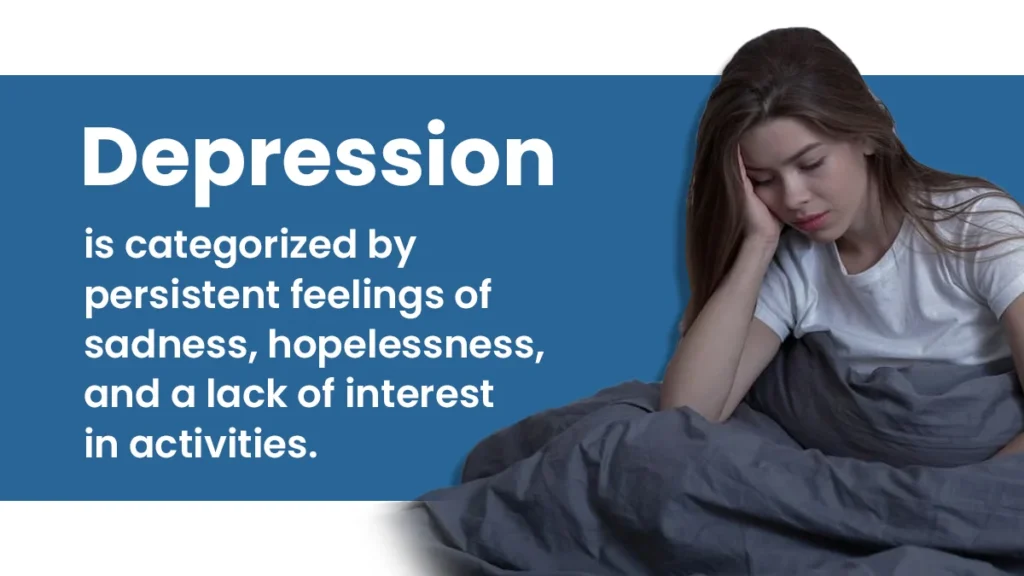Depression, a pervasive mental health condition, is influenced by a complex interplay of biological, psychological, and environmental factors. Neurochemical imbalances, genetic predispositions, and hormonal fluctuations contribute to its physiological roots. Concurrently, life events, chronic stress, and interpersonal conflicts can trigger or exacerbate depressive symptoms.
Exploring the multifaceted nature of depression is necessary for developing effective interventions and support systems.
Key Takeaways
Social support, lifestyle changes, and self-care practices can help in managing depression symptoms and promoting overall mental well-being. Here’s what you need to know:
- Depression is categorized by persistent feelings of sadness, hopelessness, and a lack of interest in activities.
- Depression often results from a complex interplay of genetic, biological, and environmental factors.
- Adverse life events and chronic stressors can significantly trigger or exacerbate depressive symptoms.
Contact The Haven Detox-New England at (844) 933-4145 for personalized health care to foster long-term wellness.

What is Depression
Depression is a mental health disorder characterized by persistent feelings of hopelessness, sadness, and a lack of interest in daily activities. It affects thoughts, emotions, and physical well-being, often leading to disruptions in daily life.
Symptoms include changes in appetite, concentration, and sleep patterns, along with fatigue and feelings of worthlessness. Various factors, including genetic predisposition, chemical imbalances in the brain, and life events, can trigger manic depression.
It is a serious condition that necessitates understanding, support, and awareness, as those experiencing it often face challenges in coping with their emotions and maintaining a healthy daily life.
Symptoms of Depression
Symptoms are indications or signs that suggest the presence of a particular condition or disease. They can vary widely depending on the underlying cause.
Here are some common types of depression symptoms:
Physical Symptoms
- Fatigue: Tenacious feelings of tiredness and lack of energy, even after adequate rest.
- Changes in Sleep Patterns: Insomnia or excessive sleeping can be indicative of depression.
- Appetite Changes: Significant weight loss or gain and changes in eating habits.
- Aches and Pains: Unexplained physical discomfort, such as headaches or muscle aches.
- Digestive Problems: Issues like nausea, constipation, or digestive distress may occur.
Emotional Symptoms
- Persistent Sadness: Overwhelming feelings of sadness, emptiness, or hopelessness.
- Loss of Interest: Reduced interest or pleasure in activities once enjoyed.
- Irritability: Increased sensitivity, frustration, or a short temper.
- Crying Spells: Frequent episodes of uncontrolled crying.
- Isolation: Withdrawing from social activities and distancing oneself from friends and family.
- Low Self-Esteem: A negative view of oneself and a sense of worthlessness.
Cognitive Symptoms
- Difficulty Concentrating: Trouble focusing, making decisions, or remembering things.
- Negative Thoughts: Persistent negative thoughts about oneself, the future, or the world.
- Self-Blame: Feelings of guilt and self-blame, even for minor issues.
- Slow Cognitive Processing: Slowed thinking, speech, and physical movements.
- Indecisiveness: Struggling to make decisions, regardless of their significance.
- Memory Issues: Difficulty recalling information or events.
It’s important to note that occasionally experiencing some of these symptoms is a normal part of life. Still, when they persist for a lengthy period and pointedly interfere with daily functioning, it may be a sign of depression.
Causes of Depression
Depression, a complex mental health condition, and its causes are often multifaceted, involving a combination of genetic, biological, environmental, and psychological factors.
Here are some common contributors to the development of depression:
Biological Factors
Genetic Predisposition: One significant factor contributing to major depression is genes. Researchers and studies indicate that individuals with a family history of depression are more susceptible to developing the disorder. Certain genetic variations may influence the brain’s neurotransmitter function, disrupting mood regulation and increasing the risk of depression.
Neurochemical Imbalances: Chemical imbalances in the brain, particularly involving neurotransmitters such as serotonin, dopamine, and norepinephrine, are closely linked to depression. Low levels of these neurotransmitters can disrupt communication between nerve cells, leading to mood disturbances and the manifestation of depressive symptoms.
Psychological Factors
Traumatic Experiences: Trauma, whether physical, emotional, or psychological, can be a significant trigger for depression. Neglect, childhood abuse, or other traumatic events can shape an individual’s mental and emotional well-being, predisposing them to depressive episodes later in life.
Chronic Stress: Prolonged exposure to stress, whether due to work, relationships, or financial difficulties, can contribute to the development of depression. Chronic stress triggers the release of stress hormones, affecting the brain’s structure and function, ultimately leading to changes in mood regulation.
Personality Factors: Certain personality traits, such as low self-esteem, pessimism, and a tendency to ruminate on negative thoughts, can increase vulnerability to depression. Individuals with these traits may be more prone to interpreting life events and daily activities in a negative light, perpetuating a cycle of depressive thinking.
Environmental Factors
Social Isolation: Humans are integrally social creatures, and a lack of meaningful social connections can profoundly impact mental health. Social isolation or a lack of support systems can contribute to feelings of loneliness and despair, increasing the risk of depression.
Economic Factors: Socioeconomic status plays a role in mental health, and individuals facing economic hardships may be more susceptible to low moods or depression. Financial instability, unemployment, or inadequate access to resources can create a stressful environment, fostering the development of depressive symptoms.
Cultural and Societal Influences: Cultural expectations, societal norms, and stigmas surrounding mental health can also contribute to premenstrual dysphoric disorder. Discrimination, prejudice, or the inability to meet cultural expectations may result in feelings of inadequacy and contribute to the onset of depressive disorders.
Relationship Between Chronic Illness and Depression
The link between chronic illness and depression is a complex and bidirectional relationship. Chronic illnesses, which are long-term medical conditions that often require ongoing management and care, can have a significant impact on a person’s mental health. Conversely, young people with depression may be at an increased risk of developing certain chronic illnesses or experiencing worsened symptoms.
Here are some key points to consider when exploring the link between chronic illness and persistent depressive disorder:
Biological Factors
Chronic illnesses can affect the body’s physiological processes, including inflammation and immune system function, which may contribute to the development or exacerbation of depression.
Conversely, depression can impact the immune system and other bodily functions, potentially increasing the risk of certain chronic conditions.
Psychosocial Factors
Coping with a chronic illness can be emotionally challenging. The stress, uncertainty, and lifestyle changes associated with managing a long-term health condition can contribute to the development of depression.
Additionally, according to additional resources, the stigma or limitations associated with certain illnesses may lead to feelings of isolation and hopelessness.
Medication Side Effects
Some medications used to manage chronic illnesses may have side effects that impact mood and contribute to depressive symptoms. Mental health professionals need to monitor and adjust medications to minimize these effects.
Reduced Quality of Life
Chronic illnesses such as depression and anxiety disorder often affect daily functioning and quality of life. Pain, fatigue, self-harm, and limitations in physical abilities can lead to decreased social interactions, job loss, and disruptions in relationships, all of which can contribute to feelings of depression.
Behavioral Factors
Depression can also affect a person’s behavior in ways that may exacerbate chronic conditions. For example, individuals with treatment-resistant depression may be less likely to adhere to treatment plans, engage in healthy lifestyle behaviors, or seek timely medical care.
Common Comorbidities
Depression is frequently comorbid with certain chronic conditions, such as cardiovascular diseases, diabetes, and autoimmune disorders. Managing both the physical and mental health aspects is crucial for overall well-being.
Cyclical Nature
The relationship between chronic illness and depression is often cyclical. Depression can worsen the symptoms and outcomes of chronic conditions, and the challenges associated with managing a chronic illness can contribute to the persistence of depression.
Lifestyle Choices and Depression
There is a well-established link between lifestyle factors and depression. While depression is a complex mental health condition with various contributing factors, lifestyle choices can significantly influence its onset, severity, and management.
Here are some key lifestyle factors that have been associated with depression:
Diet: Nutrition plays an important role in mental health. A food rich in vegetables, fruits, whole grains, and lean proteins has been linked to a lower risk of depression. On the other hand, a diet high in processed foods, sugars, and unhealthy fats may contribute to an increased risk.
Physical Activity: Consistent engagement in regular exercise has demonstrated a positive influence on mood and can effectively alleviate symptoms associated with depression. Physical activity triggers the release of neurotransmitters, including endorphins, commonly called ‘feel-good’ hormones.
Sleep: Poor sleep patterns, including insomnia or irregular sleep schedules, are associated with a higher risk of depression. Quality sleep is essential for overall mental well-being, and sleep disruptions can contribute to mood disorders.
Stress Management: Chronic stress is a known risk factor for mild depression. Effective stress management techniques, such as meditation and relaxation exercises, can help reduce the likelihood of developing depression.
Social Connections: Social isolation and a lack of social support are risk factors for serious illness. Maintaining meaningful social connections and engaging in positive social activities can improve mental well-being.
Substance Abuse: The misuse of harmful substances, including harmful drugs and alcohol, can contribute to the development and exacerbation of bad mood. Substance abuse or substance use disorder can interfere with brain function and negatively impact mood regulation.
Coping Skills: Individuals with effective coping skills and resilience are better equipped to handle life’s challenges, reducing the likelihood of developing moderate depression in response to stressors.
Frequently Asked Questions (FAQ)
Does lifestyle cause depression?
Depression is a mental health condition affecting women, teens, and older adults worldwide. It can be influenced by lifestyle factors such as stress, sleep patterns, and exercise. While there’s no single cause, physical changes, serious illnesses, and mood swings contribute.
Treatment plans, including different types of antidepressants, cognitive-behavioral therapy, and medical help, are essential for managing mental health symptoms.
What are the most common causes of depression?
Depression, a common mental health condition, has different reasons, with no single one identified. Genes, stressful events, seasonal changes, brain chemistry, and persistent depressive disorder contribute. Treatment involves talk therapy, medication, and psychological treatments.
Brain stimulation therapies, self-help, and support from family members and healthcare providers are crucial for effective outcomes.
What causes clinical depression?
Clinical depression can stem from various factors, including genetic predisposition, imbalances in brain chemicals, and life events. Seasonal affective disorder, prevalent in winter months, and major depressive disorder and bipolar disorder are some types of depression.
According to research, women may experience depression differently due to hormonal changes. Risk increases with serious illnesses, anxiety disorders, and postpartum depression. Clinical trials, self-help tips, and effective treatments such as medication, antidepressant medication, therapy, and electroconvulsive therapy can help manage all forms of depression.
Prioritize Mental Wellness With The Haven Detox-New England
Break free from depression and rediscover the joy of living with The Haven Detox-New England.
Our residential treatment program creates a haven for healing, a sanctuary where you can rebuild and rediscover your true self. Our skilled therapists, armed with evidence-based therapies, compassionately guide you through overcoming negative emotions, low self-esteem, and depressive moods.
Your mental wellness journey starts here with personalized care and unwavering support. Take the first step by contacting us at (844) 933-4145 today.




